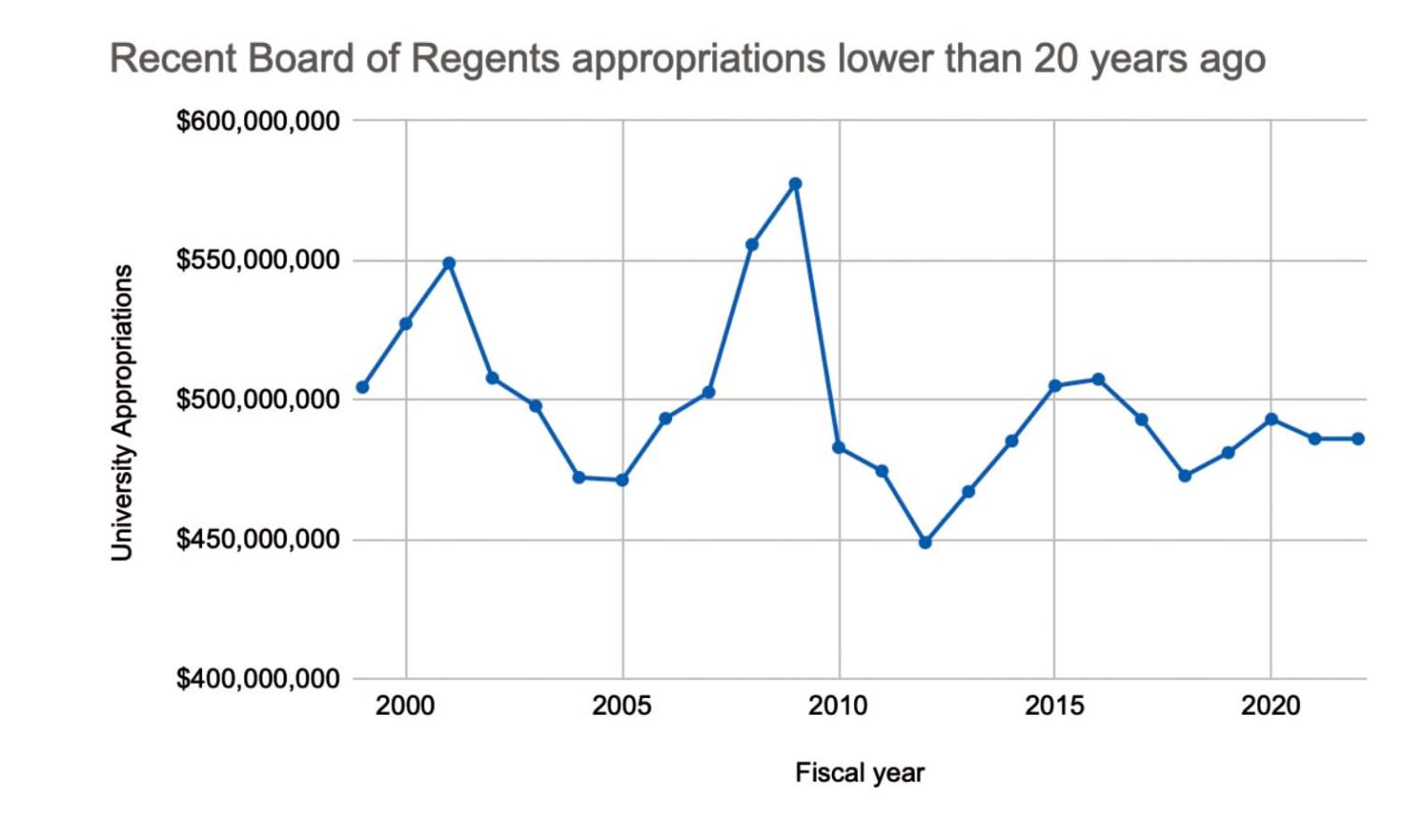Proposed GOP budget for state universities is less than 20 years ago
Mar 31, 2022
House lawmakers have proposed another year without a state funding increase for the Iowa Board of Regents, instead introducing a $12 million scholarship program for future teachers and students studying other high-demand professions.
If the House plan passes as proposed, 2023 would be the third year in a row that the Regents universities would see no increase in their state allocation.
“We don’t cut their general fund appropriation,” said Rep. David Kerr, a leader on the education budget proposal. “But this is just what fit into the budget. That’s the way I decided to move the budget forward.”
Data from the Board of Regents shows state funding for the University of Iowa, Iowa State University and the University of Northern Iowa has fluctuated over the past 20 years. This fiscal year’s allocation of just over $486 million is nearly $20 million less than the state gave to public universities in 1999 — not adjusted for inflation.
To put that into scale: $100 in 1999 would have the same buying power as about $173 in 2022, according to a calculator by the Bureau of Labor Statistics. That means prices have risen significantly while the state allocation has decreased.
The universities are not funded solely through state appropriations. Board spokesperson Josh Lehman identified three main funding streams for the universities: “tuition, state appropriations, and savings/reallocations.”
“These three areas must be looked at collectively, as each is interdependent on the other, to come up with total financial resources available to provide the top-notch education that our students deserve,” Lehman wrote.
How did we get here?
Recent history on Board of Regents funding
The Board of Regents slashed university budgets in the summer of 2020 amid the first months of the COVID-19 pandemic. The Board voted to decrease University budgets by $65.4 million for the upcoming year, citing COVID and an $8 million cut in the state appropriation as the impetus.
“We are working to minimize the effect of our financial challenges on students, faculty and staff. However, this is really an unprecedented situation,” Iowa State University President Wendy Wintersteen said at a July 2020 meeting. “These are extraordinary times and we are forced to make difficult decisions to maintain the financial health of the university.”
When the Legislature reconvened in 2021, the Regents requested a restoration of that $8 million cut, plus an additional $10 million for higher education.
Lawmakers instead approved an education budget with status-quo funding for the public universities. Kerr said in 2021 that COVID-19 relief funds and a declining enrollment made the flat appropriation “very adequate” in 2021. House Speaker Pat Grassley said the funding would also encourage universities to rein in spending.
The 2021 budget did make one major change for the Board of Regents: it removed a tuition freeze, allowing the universities to increase the cost of attendance. They voted to do so in July, approving a 3.5% increase for in-state students at University of Iowa and Iowa State University. Residential undergraduates at the University of Northern Iowa saw a 1.5% increase.
“A lack of funding has greatly increased our financial challenges,” Wintersteen said in a 2021 meeting. “Without competitive salaries and salary increases, Iowa State will see increased difficulty in retaining excellent faculty and talented staff members. Increasing inflation for supplies and services is also a serious concern.”
Grassley said introducing the $12 million scholarship proposal rather than a general fund increase for fiscal year 2023 was a “creative way” to encourage competition among public universities and address the state’s workforce shortage. Lehman said the Board of Regents was “very appreciative” of the proposal.
“We look at this as a way that, hey, the Legislature’s going to step up and invest in our Regents institutions — and more importantly, invest in our students across the state,” Grassley said.
House Democrats criticized the proposal in a committee meeting March 22, arguing the universities need additional funding to improve their programs.
“We’re paying more at the gas pumps. We’re paying more at the grocery store. Our universities have the same issues,” said Rep. Sue Cahill, D-Marshalltown. “For us to have the highest quality programs for our students, we need to provide them with some opportunities to increase and improve their programs as well.”
Negotiations on the fiscal year 2023 budget are ongoing. The Senate has not yet released its education budget proposal.
“Funding challenges are common across the United States and are not unique to the state of Iowa,” Lehman said in a statement. “The Board has had a positive partnership with the state of Iowa for more than 100 years, and we will continue to work with the governor’s office and Legislature to advocate for the level of funding necessary to provide high-quality education for our students.”














